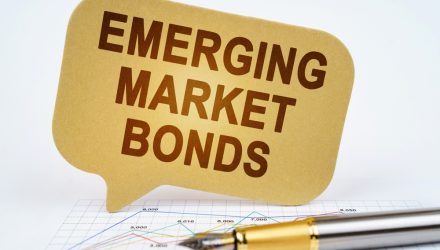When it comes to emerging markets bonds, many fixed income investors face a conundrum. They’re attracted to the asset class by yields that are well above those found on developed world sovereign debt, but they’re apprehensive regarding the elevated risk profile associated with developing world bonds.
One way of damping risk with emerging bonds is via exchange traded funds with broad lineups focusing on investment-graded issues. Enter the Vanguard Emerging Markets Government Bond ETF (VWOB). Home to 764 bonds, VWOB certainly has a broad lineup, and it’s diverse at that, as none of its holdings exceeded a weight of 0.58% at the end of the first quarter.
Investors can obtain VWOB’s benefits without having to sacrifice income, as the Vanguard ETF sports a tempting 30-day SEC yield of 6.79%. VWOB’s quality traits are important because its holdings are denominated in dollars, which can be a hallmark of more volatile developing economies.
“The incentives between issuing local- or hard-currency debt also led to different geographical adoption of each approach. Certain countries, such as South Korea, Thailand, and the Czech Republic, have very little sovereign debt outstanding in U.S. dollars, as they prefer to issue in their local currencies. On the other hand, the local-currency debt of Middle East nations is mostly excluded from broad local-currency indexes at this point,” noted Morningstar analyst Lan Anh Tran.
Speaking of bonds issued by governments in the Middle East: Saudi Arabia, the United Arab Emirates, and Qatar combine for over 21% of VWOB’s roster. That implies some leverage to oil prices, as all three of those countries are members of the Organization of Petroleum Exporting Countries (OPEC). VWOB’s weight to Saudi bonds could decline in the coming years because the kingdom has been issuing more riyal-denominated debt in recent years.
Even with that trait, VWOB is proving resilient in the face of declining oil prices this year. While oil futures and energy stocks are sporting year-to-date losses, VWOB is higher since the start of 2023 while sporting significantly less volatility than those other asset classes. VWOB’s relative sturdiness this year highlights the advantages of Vanguard’s focus on tempering concentration risk.
“This practice limits outsize exposure to any single country at the expense of full market representation. Though it tilts the portfolio toward smaller economies relative to the opportunity set, this approach serves as a guardrail for the high level of geopolitical tail risk in emerging markets,” added Tran.
More than 56% of VWOB holdings are rated investment-grade, and its annual fee of 0.20% compares favorably with the category average of 0.97%.
For more news, information, and analysis, visit the Fixed Income Channel.
The opinions and forecasts expressed herein are solely those of Tom Lydon, and may not actually come to pass. Information on this site should not be used or construed as an offer to sell, a solicitation of an offer to buy, or a recommendation for any product.

